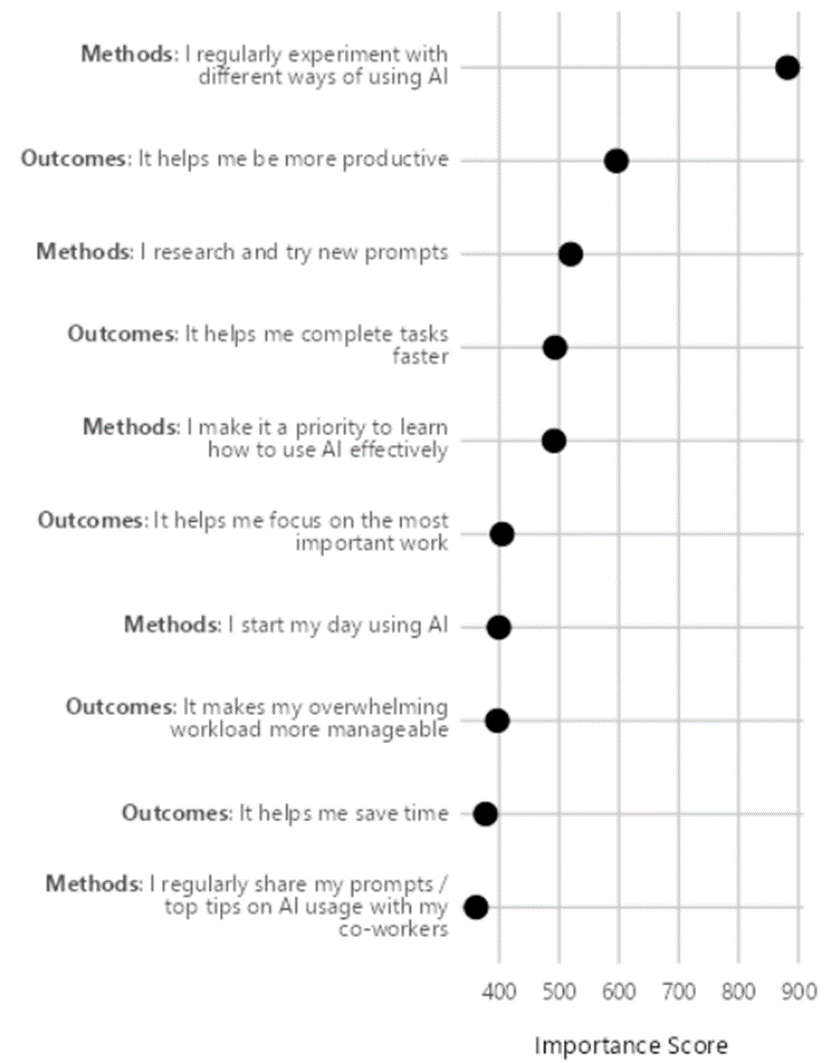
There's been plenty of fanfare about the potential for generative AI to enhance productivity. But translating that to the messy reality of day-to-day work for millions of knowledge workers isn't straightforward. Microsoft's second AI and Productivity Report moves beyond controlled experiments to examine AI's impact in actual workplace settings. The results? Unsurprisingly, generative AI is already delivering measurable productivity gains for knowledge workers.
Key Findings
1. Measurable Productivity Boosts
Microsoft's large-scale field experiment involving over 6,000 employees across 60+ organisations revealed significant efficiency gains for those using Copilot for Microsoft 365:
- 11% fewer emails read
- 4% less time spent on email interactions
- 10% more documents edited (13% for power users, more on those below)
These improvements suggest AI tools are helping workers process information more efficiently, potentially freeing up time for higher-value tasks. But the story doesn't end there. The study also found that some organisations saw far more dramatic improvements, with relative decreases of up to 20-25% in both emails read and time spent interacting with email.
2. Role-Specific Impact
One of the more intriguing findings is how the benefits of generative AI differ across job roles and functions. Customer service and sales professionals reported some of the highest productivity gains and job satisfaction improvements from using Copilot. In contrast, legal and R&D professionals experienced fewer benefits, likely due to the more complex and variable nature of their work.
This variation highlights the importance of tailoring AI implementation strategies to specific roles and departments. It also suggests that as AI tools evolve, we may see more specialised applications designed to address the unique challenges of different professions.
3. The Power User Phenomenon
The report emphasises that the impact of AI tools depends heavily on how widely and effectively they're adopted. The most valuable, and unsurprising, finding is that regular experimentation with AI is by far the strongest predictor of becoming a "power user" who gains the most benefit from these tools.

This finding has important implications for organisations: encouraging a culture of experimentation and learning, and providing ample opportunities for employees to explore AI capabilities, will be instrumental to getting the best out of the technology.
4. Document Creation and Editing: A Boost in Output
People with access to Copilot created and edited 10% more documents overall, with heavy users of Word, Excel, and PowerPoint seeing an even more impressive 13% increase. Some organisations reported increases as high as the 25-30% range.
This spike in document activity could be interpreted in two ways:
- AI assistance is making it easier to produce and revise content, leading to increased output.
- Time saved in other areas (like email management) is being reinvested into document creation and editing.
Either way, it's clear that AI is having a tangible positive impact on knowledge workers' ability to generate and refine written content.
Easing the Mental Load: AI's Impact on Cognitive Demands
The report also sheds light on how AI has been affecting the cognitive demands of various tasks. Early studies suggest a complex picture:
- Some research indicates AI could increase metacognitive load through the need for prompt engineering and output evaluation.
- Other studies found that tools like Copilot reduced perceived mental demand and stress for certain tasks.
A Microsoft experiment with 40 employees creating a sales report found that those using Copilot reported significantly lower mental demand (30 out of 100) compared to the control group (55 out of 100). Similar improvements were seen in perceived stress, difficulty, and time pressure.
These findings hint at AI's potential beyond mere time-saving, but also reduce the mental strain associated with complex knowledge work tasks.
Practice Makes Perfect: Adoption and Utilisation Matter
The report emphasises that simply having access to AI tools isn't enough to guarantee productivity gains. How widely and effectively these tools are adopted matters. Some key insights on adoption include:
- Experimentation is everything: Regular experimentation with AI emerged as the strongest predictor of becoming a "power user", the outliers who gain the most from using generative AI tools.
- Time unlocks benefits: Users who had been working with Copilot for more than 10 weeks reported greater benefits compared to those with shorter usage durations.
- Role-specific adoption: Customer service and sales professionals reported some of the highest adoption rates and productivity gains, while legal and R&D professionals showed lower adoption and fewer benefits.
These findings underscore the importance of promoting an organisational culture of AI experimentation and providing ongoing support and training to help employees maximise the value of these tools.
Maximising AI's Potential with LLM Beefer Upper
While Microsoft's research demonstrates the potential of generative AI in the workplace, it also highlights the challenges of effective implementation. This is where a tool like the LLM Beefer Upper app can play a crucial role. By automating advanced prompting techniques and incorporating multi-agent setups, LLM Beefer Upper helps users overcome common hurdles in AI adoption:
- Improved Output Quality
The app's multi-agent approach, which includes fact-checking and refinement stages, can help mitigate concerns about AI accuracy and reliability, including with longer, more complex tasks – a key issue for professionals in fields like legal and R&D who reported less benefit from current AI tools. - Reducing Cognitive Load
By automating complex prompting strategies and the creation of custom, reusable multi-agent prompt templates, as well as being able to see the AI’s ‘thought process’ with the standard audit trail of the agents ‘showing their working’ LLM Beefer Upper can help reduce the metacognitive demands associated with using generative AI. - Encouraging Experimentation
The app encourages regular experimentation with AI through its simple interface and wide range of templates that can easily be refined with more use. Consistent AI experimentation is a key predictor of becoming a power user who gains maximum benefit from these tools. - Bridging the Gap for Specialised Roles
For professionals in fields like legal and R&D who saw fewer benefits from general AI tools, LLM Beefer Upper's customisable templates and multi-agent approach can help create more tailored and effective AI workflows with agents dedicated to focusing on specific complex aspects of a task. - Enhancing Multilingual Capabilities
The app's ability to create complex, multi-step prompts can be particularly useful in multilingual contexts, helping to break down language barriers and improve global collaboration. Try out the language translation prebuilt template to see how good it is.
Embracing AI's Transformative Potential
Microsoft's latest research paints a picture of generative AI as a powerful but complex tool for enhancing workplace productivity, with unevenly distributed benefits as of now. While the benefits are clear, realising its full potential requires thoughtful implementation, ongoing experimentation, and a willingness to rethink established work processes.
Tools like LLM Beefer Upper offer a pathway to more effective AI utilisation, helping bridge the gap between AI's promise and its practical application in diverse work environments. By automating advanced prompting techniques and encouraging consistent experimentation, LLM Beefer Upper can help organisations and individuals maximise the productivity gains and cognitive benefits highlighted in Microsoft's research.
One thing is clear: the most successful organisations will be those that not only adopt these technologies but also invest in helping their employees become skilled AI collaborators.
***Connect with me on Linkedin and follow me on Twitter.

